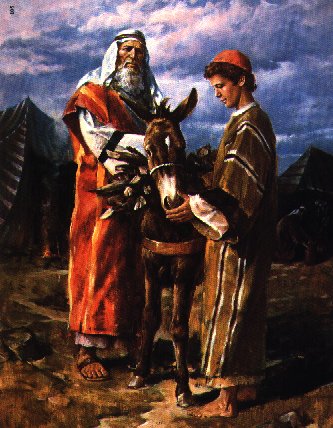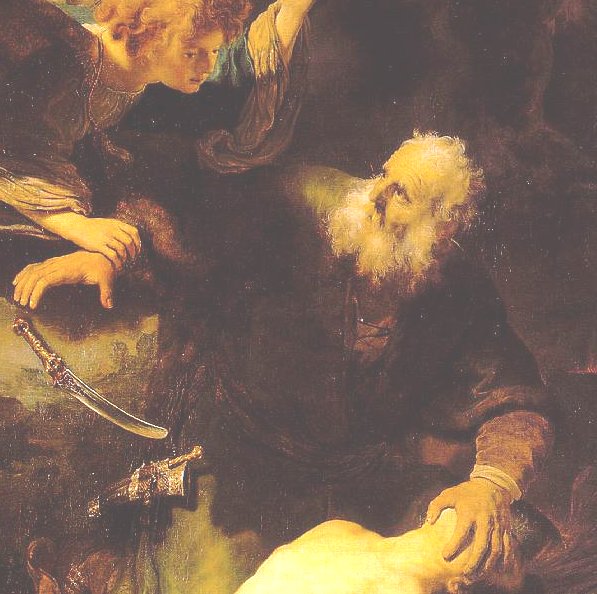|
Scriptural Text [& Editorial]
|
Commentary & Explanation
|
Footnotes ~ References ~ JST
|
 CHAPTER 12
CHAPTER 12

Abram shall become a great nation—He and his seed shall bless all
the families of the earth—He travels from Haran to the land of
Canaan—Because of famine he goes down into Egypt—Abram and
Sarai tested in Pharaoh's court.
|
|
|
1 NOW the LORD had asaid unto
bAbram, cGet thee out of thy
dcountry, and from thy ekindred, and from
thy ffather's house, unto a gland that I
will shew thee:
2 And I will make of thee a agreat
bnation, and I will cbless thee, and make
thy dname great; and thou shalt be a blessing:
3 And I will abless them that bless
thee, and bcurse him that ccurseth thee:
and in thee shall all dfamilies of the earth be
eblessed.
|
|
1a
TG
Creation
b
Isa. 45:12;
D&C 29:36;
D&C 38:1;
D&C 45:1;
Moses 3:1;
Abr. 5:1
2a
OR done
b
HEB stopped, ceased; from the
verb shavat, the noun
shabbat (Engl. Sabbath)
means a stopping of cessation;
D&C 77:12;
Moses 3:2;
Abr. 5:2 (1-3);
TG
Rest
c
TG
Industry
3a
TG
Sabbath
b
Ex. 20:11;
Mosiah 13:19 (16-19);
D&C 77:12;
Moses 3:3 (1-3);
Abr. 5:3 (1-3);
TG
Sacred
c
Ex. 31:17
d
OR created through working
|
4 So Abram departed, as the LORD had spoken unto him;
and Lot went with him: and Abram was aseventy and
five years old when he departed out of Haran.
5 And Abram took aSarai his wife,
and bLot his cbrother's son, and all
their substance that they had gathered, and the souls that they had
dgotten in eHaran; and they went forth to
go into the land of Canaan; and into the land of Canaan they came.
|
|
1a
TG
Creation
b
Isa. 45:12;
D&C 29:36;
D&C 38:1;
D&C 45:1;
Moses 3:1;
Abr. 5:1
2a
OR done
b
HEB stopped, ceased; from the
verb shavat, the noun
shabbat (Engl. Sabbath)
means a stopping of cessation;
D&C 77:12;
Moses 3:2;
Abr. 5:2 (1-3);
TG
Rest
c
TG
Industry
3a
TG
Sabbath
b
Ex. 20:11;
Mosiah 13:19 (16-19);
D&C 77:12;
Moses 3:3 (1-3);
Abr. 5:3 (1-3);
TG
Sacred
c
Ex. 31:17
d
OR created through working
|

6 ¶ And Abram passed through the land unto the
place of Sichema, unto the
plain of Moreh. And the aCanaanite was then in the
land.

7 And the LORD appeared unto
Abrama, and said,
aUnto thy bseed will I give this
cland: and there builded he an daltar
unto the LORD, who appeared unto him.

|
6a Sichem This is Sechem or
Shechem which
was situated in the plains of Moreh. This 'plain (or oak) of Moreh' is
probably the same district 'Moriah' where was found the mountain on which
Isaac was offered in sacrifice (Genesis 22:2). The nearest mount is Mount
Gerizim though Mount Ebal is only a third of a mile distance. Mount Gerizim
is the place where instructions are given that a blessing should be 'set' on
Mount Gerizim and a curse on Mount Ebal (Deut. 11:29; 27:12; Josh. 8:33).
Jotham's parable was delivered from Gerizim (Judg. 9:7). Joseph's tomb in
located in this area (Josh. 24:32). Rehoboam came to this location to be
crowned (1 Kgs. 12:1; 2 Chr. 10:1). Shechem is associated with Mount Ephraim.
It is where Joshua called the elders of Israel for their heads adn judges and
officers to be presented before God (Josh. 24:1). The old location of the
tabernacle was mid-way between Shechem and Bethel, the two sights of the
alters and visions of Abraham and Jacob. The Samaritian Temple site is there
at Shechem. Jacob's Well is at ancient Shechem, the sight where the Savior
met with and spoke with the women at the well (John 4:1-42). As can be seen,
there is great significant relavance to this sight.
The 'tradition' that Mount Moriah was the same as the hill on which Solomon
built the temple was not recorded until Josephus first records it as such.
This is well within the time periodd where the Jewish traditions attempt to
take over everything and make it all relate to the Jewish perspective.
7a the LORD appeared unto Abram
The LORD had previously appeared unto Abraham in response to the prayer of
Abraham and Lot in Haran (See Abraham 2:6-13) and there presented Abraham
with the promises and blessings that would be given as well as introducing
Himself as Jehovah (see particularly verse 8). Thus when the LORD appears
unto Abraham near
Bethel,
|
1a
Gen. 10:18 (15-19);
Gen. 13:7;
Moses 7:7 (7-8);
Abr. 1:22 (21-25);
Abr. 2:18;
Joseph's Land
When removed from the Jewish perspective to the perspective of Joseph,
Ephraim and the Covenant of Abraham all being centered in and about Shecham,
one must truely consider that Ephraim was named as the Firstborn in Israel.
It was from Mount Gerizim that Abraham proclaimed the name of his alter as
being 'Jehovah-Jireh', meaning 'The Lord will provide'. From the land of
Abraham, Jacob, Jospeh and Ephraim, is the provision of redemption given
through the Promised Covenant of the Fathers, that Covenant which included
from before the foundation of the earth the promise of Messiah, even Messiah
ben Joseph who is the same as Messiah ben David (See
Messiah ben Joseph ~ Messiah ben David).
|
8 And he removed from thence unto a mountain on the
east of aBeth-el, and pitched his tent, having
bBeth-el on the west, and cHai on the
east: and there he builded an altar unto the LORD, and
dcalled upon the ename of the LORD.
9 And Abram journeyed, going on still toward the south.
|
|
|
10 ¶ And there was a afamine in the
land: and Abram went down into Egypt to sojourn there; for the famine
was grievous in the land.
11 And it came to pass, when he was come near to
enter into Egypt, that he asaid unto Sarai his wife, Behold
now, I know that thou art a fair woman to look upon:
12 Therefore it shall come to pass, when the Egyptians shall see thee, that they shall say, This is his wife: and they will kill me, but they will save thee alive.
13 Say, I pray thee, thou art my
asister: that it may be well with me for thy sake; and my
soul shall live because of thee.
|
|
|
14 ¶ And it came to pass, that, when Abram was come
into Egypt, the Egyptians abeheld the woman that she
was very fair.
15 The princes also of Pharaoh saw her, and commended her before Pharaoh: and the woman was taken into Pharaoh's house.
16 And he entreated Abram well for her sake: and he had sheep, and oxen, and he asses, and menservants, and maidservants, and she asses, and camels.
|
|
|
17 And the LORD aplagued Pharaoh and
his house with great bplagues because of Sarai Abram's
wife.
18 And Pharaoh called Abram, and said, What is
this that thou hast adone unto me? why didst thou
not tell me that she was thy wife?
19 Why saidst thou, She is my
asister? so I might have taken her to me to wife: now
therefore behold thy wife, take her, and go thy way.
20 And Pharaoh commanded his men concerning
him: and they sent him away, and his wife, and all that he had.
|
|
|